News from the International Office
Building Virtual Bridges: Online workshop with Botswana Open University
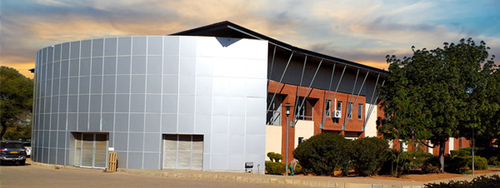 Photo: BOU
Photo: BOU
Hagen, 21 March – “Dumelang and good morning!” – With this warm welcome, representatives and staff from Botswana Open University (BOU) and the FernUniversität in Hagen opened a joint online workshop.
During the four-and-a-half-hour session, the participants introduced their institutions, identified shared approaches to distance education, and exchanged ideas on potential future cooperation. The event offered valuable insights into each university’s structure and strategy, laying the groundwork for deepened collaboration in the field of online learning.
About the BOU
The Botswana Open University (BOU) was established in 2017 as the successor to the Botswana College of Distance and Open Learning (BOCODOL). The goal of the transformation was to establish a comprehensive national institution to meet the growing demand for distance learning in the country.
Digital Networking as a Strategic Opportunity
The partnership between the FernUniversität in Hagen and Botswana Open University (BOU) has been growing steadily for over a year. Like the FernUniversität, BOU was established in 2017 in response to the rising demand for flexible, university-level distance learning. As distance education institutions often hold a unique position in their respective countries – frequently being the sole providers of such offerings – exchanges with similarly positioned universities can offer valuable insights and impetus for development.
While international delegation visits have long been a proven means of deepening university partnerships, they are also resource-intensive. This led to a key question: why not collaborate virtually? From that idea, the concept for this digital workshop was born. For the FernUniversität, it was a first—an innovative step that Desirée Kampmeier, consultant in the International Office, describes as a promising experiment:
“Face-to-face dialogue and in-person exchange is important and can’t be replaced in the long term. But virtual formats like this workshop offer a low-threshold opportunity to bring together a wide range of stakeholders and lay the groundwork for shared understanding.”
From Theory to Practice: A Dynamic Exchange
What can the two universities learn from each other? Where do their approaches to distance learning align—and where do they differ? And how are teaching and student support services structured at BOU? These were just some of the key questions at the heart of the interactive sessions.
Following opening remarks by university leadership, participants broke into topic-specific breakout rooms to connect directly. Various departments—including the university library, career services, student services, and research and language support—presented their work and engaged in focused discussions. The opportunity to ask questions, exchange ideas, and build contacts proved especially valuable in laying the groundwork for future collaboration.
A Beginning with Future Potential
One thing is clear: this digital workshop was just the beginning. Plans are already in place to continue the virtual exchange – and perhaps even to meet in person in the near future. While digital formats provide an accessible entry point, face-to-face interaction remains an essential and enriching part of any successful international university partnership.
How a Study Buddy Scheme Can Strengthen Degree Programs Over the Long Term
Study Buddies at the FernUniversität
The master’s program Modern German Literature in a Media-Cultural Context at the FernUniversität introduced a study buddy initiative four semesters ago and has since successfully established around 40 active buddy partnerships.
Low-threshold support for students at every stage: Many universities offer buddy programs (especially for foreign students) that connect newcomers with more experienced peers from higher semesters. These programs provide accessible support during the early stages of a degree program – whether it’s navigating university structures, understanding study expectations, or simply building social connections. The buddy relationship fosters both academic orientation and a stronger sense of belonging within the learning community. At the same time, the buddies themselves benefit by strengthening their communication skills and gaining insight into diverse student experiences.
Desirée Kampmeier from the International Office spoke with Dr. Wim Peeters, who initiated the study buddy program in the Contemporary German Literature in a Media-Cultural Context master’s program at the FernUniversität in Hagen. The success of the program has been inspiring – and we’re pleased to showcase this sustainable model that supports students while enriching the degree program as a whole.
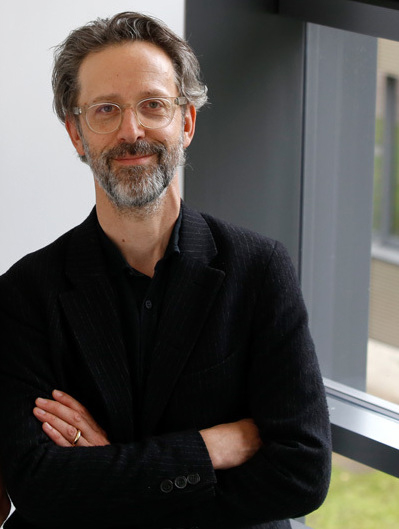 Photo: private
Photo: privateDr. Wim Peeters, a Belgian by birth, has been an academic advisor at the Institute for Modern German Literature and Media Studies at the FernUniversität since 2021. His current research focuses on literature and commentary, self-help, the home, victimhood, and gender. Identity, intermediality, and interculturality are also recurring themes in his work.
Dr. Peeters, what inspired you to introduce the Buddy Program for the degree course Modern German Literature (MGL)?
Wim Peeters: We deliberately made the admission requirements for the new master’s program quite broad: anyone with a degree in a subject related to the humanities, cultural studies, or social sciences could enroll in the literary studies program. This inclusive approach allowed us to reach a much wider and more diverse group of students – but it also brought an increased need for academic guidance, especially among international students, who were sometimes unfamiliar with the freedom that characterizes literary studies in Germany.
For example, students from some academic systems find it hard to imagine being required to choose their own topics for papers without the benefit of regimented guidelines – even in their first semester. We’ve also had students who had studied in Germany before, but were still unfamiliar with the systems we use for writing papers or with the interpretive and theoretical nature of literary analysis.
These varied academic experiences led to a higher demand for counseling and, at times, to disappointment when the grades students received didn’t align with their expectations. ...
... While I was looking for possible solutions, it occurred to me that experienced fellow students – particularly those who themselves are career changers or international students with relevant experience – would be ideally positioned to provide low-threshold, peer-level support on a personal basis.
I based this assumption on my belief that networking plays a key role in academic success – especially at the FernUniversität. Although we have platforms like Moodle that provide formal channels for interaction, ideally networking should also happen outside these official forums. Career changers, in particular, often find it more difficult to integrate into these kinds of groups. That’s why we thought it would be a great advantage if these students could gain access to established study networks via their buddies. In most cases, the students who offer to be buddies are already well connected, making them ideal points of contact.
This is how the idea for our study buddy program came about. We launched a pilot phase in the winter semester of 2022, pairing master’s students who were willing to mentor their fellow students with others who were looking for support. I’m happy to say, the response was very positive.
How much effort is involved in the program for you?
Wim Peeters: Overall, you save time on counseling related to the degree program and it helps ensure that advice doesn’t come too late when it’s needed. Of course, it requires a coordinator who is prepared to invest their own time.
At the start of each semester, I promote the study buddy program through all available channels to make sure I reach the target group and recruit new buddies. Based on the feedback I receive, I then organize a preparation meeting for the future buddies. During these meetings, I emphasize that their role is simply to serve as a point of contact and to share their own experiences. They are not expected to provide professional advice or psychological counseling. It’s also important for them to know that they are never alone in their roles – I am always available to support them with any problems that may arise.
I use a questionnaire to gather information about the backgrounds of students seeking support and those who would like to be buddies. This allows me to match the two groups as effectively as possible, for example by pairing someone from Eastern Europe with someone from the same region. This process is managed using an Excel spreadsheet and can be automated to keep the workload to a minimum.
The final step is that I invite the buddies to a feedback session once a year. This is also an ideal opportunity to identify exactly what is going well and what is not in the initial phase of the program, and gives us a chance to make improvements. Overall, the effort involved is manageable once the program is up and running. In the long term, you not only save time, but also a lot of stress.
How do the course program and its students benefit from the buddy system?
Wim Peeters: The feedback from students has been very positive. One of the biggest challenges with distance learning is that you are often left to your own devices. This means you have to show a lot of initiative. However, if you are able to study in a network and also have an experienced buddy at your side, it makes everything much easier because you have someone to turn to for advice on many decisions. I’ve had very few negative experiences; there was only one case of a mismatch due to religious differences. When anything like that happens, it is important that the supervisors intervene quickly and discreetly in the background.
As far as our degree program is concerned, I’m happy to say that the buddy system has noticeably improved the introductory phase of the program. We are seeing that quality issues are already declining in the advanced modules of our master's program. If career changers do not receive adequate support at the start of their studies when they may lack certain basic skills, this naturally has an impact on the subsequent semesters.
As far as the institute is concerned, this means that we have been able to achieve real improvements in the introductory phase with the help of this tool in combination with feedback from the buddies. It's a win-win situation for everyone involved.
Incidentally, the certificate of voluntary work that we issue at the end of the semester is also greatly appreciated. Despite some initial fears that the workload for the buddies might be too much or that they might feel harassed, this has not been the case-. On the contrary, some former mentees became active buddies themselves in the following semester.
What tips would you give to other colleagues planning a similar program?
Wim Peeters: The most important thing is not to lose sight of the fact that the buddies also need to be looked after. They should never be left isolated. It’s not a lot of work, but buddies also need encouragement and must be told exactly what their role is. One good thing about Hagen is that these are mostly mature students who are quite good at assessing how career changers “tick.” They know that their fellow students are studying for a wide variety of reasons, that there are differences that need to be bridged – and success is by no means a given.
The term Study Buddy is not clearly defined, which makes it all the more important to clearly communicate what the program entails. This helps ensure that (prospective) participants do not confuse it with a mentoring program, as the role of a buddy differs significantly from that of a mentor.
A feedback session is also important; the buddies request this themselves.
Another tip is to use a well-designed system to match students. By collecting some basic information, you can generate suitable combinations. This is an important tool whose significance should not be underestimated. Success depends crucially on how well the students fit together, especially in an intercultural context. We have competent colleagues in-house who can advise on this and create appropriate tables.
It’s also essential to promote the study buddy program widely – not just through websites and welcome events, but across all available channels. International students in particular may not be as familiar with platforms like Moodle as domestic students are. Repeated communication is equally important, as we cannot assume that students will encounter the information precisely when we expect them to. Consistent visibility increases the chances that those who could benefit from the program will actually find and engage with it.
Thank you very much for sharing your experiences and practical tips for the Study Buddy Program!
Partnership between Dōshisha Law School Kyoto and the Faculty of Law in Hagen
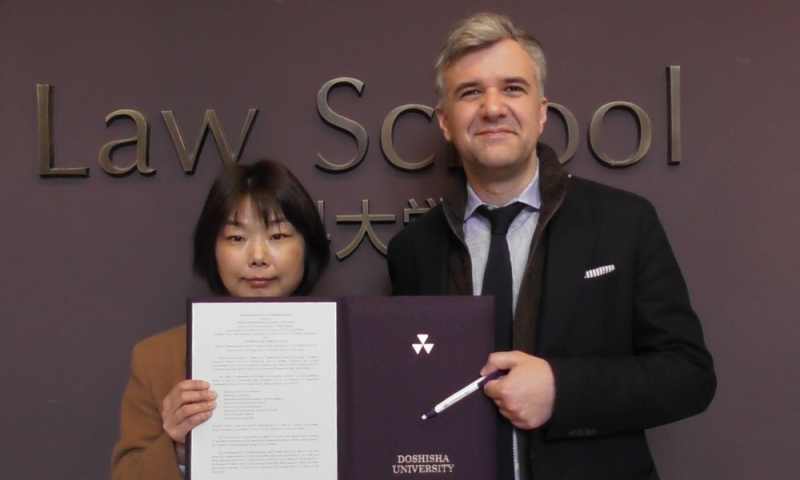 Photo: Dōshisha Law School
Photo: Dōshisha Law SchoolIn June 2024, a partnership agreement was established between the Faculty of Law at FernUniversität in Hagen and Doshisha Law School in Kyoto. The law school is located on the main campus of Dōshisha University – one of Japan’s most prestigious private universities, founded in 1920—just north of the Imperial Palace gardens in Kyoto.
The partnership was initiated during a visit by Jun.-Prof. Dr. Weitzdörfer to Dōshisha Law School in September 2023, as part of a research trip supported by the International Office. During the visit, he met with Dean Prof. Dr. Yuki Asano and Vice Dean Prof. Dr. Kōji Takahashi to lay the groundwork for the collaboration. The Memorandum of Understanding (MOU) was formally signed by Professor Weitzdörfer in March 2024 and has since been approved by the university boards/presidiums of both universities.
Long-term Relationships
The newly established partnership is based on the long-standing relationship between the FernUniversität and Prof. Dr. Hans-Peter Marutschke, who while working as an associate professor at the FernUni in 2004 was offered a full professorship by the Dōshisha University. Other faculty members also made frequent visists to Dōshisha, including Prof. Dr. Andreas Haratsch and Legal Assessor Nils Szuka.
Getting to Know Japan its Legal System “From the Inside”
The partnership agreement aims to strengthen and formalize future collaboration between the two faculties. It provides a framework for joint research visits, conferences, and symposia, as well as the exchange of teaching materials. A key element of the agreement is the planned revival of the popular study trips offered as part of the Japanese law module – an initiative that both universities successfully organized several times prior to the pandemic.
The Department of East-Asian Law
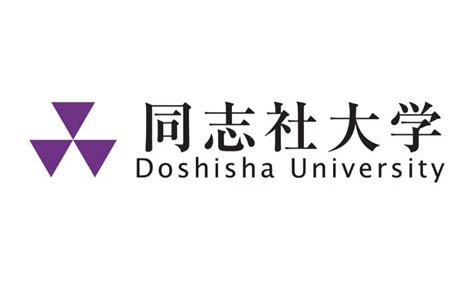 Logo: Doshisha University
Logo: Doshisha UniversityFernUni Delegation Visits Costa Rica
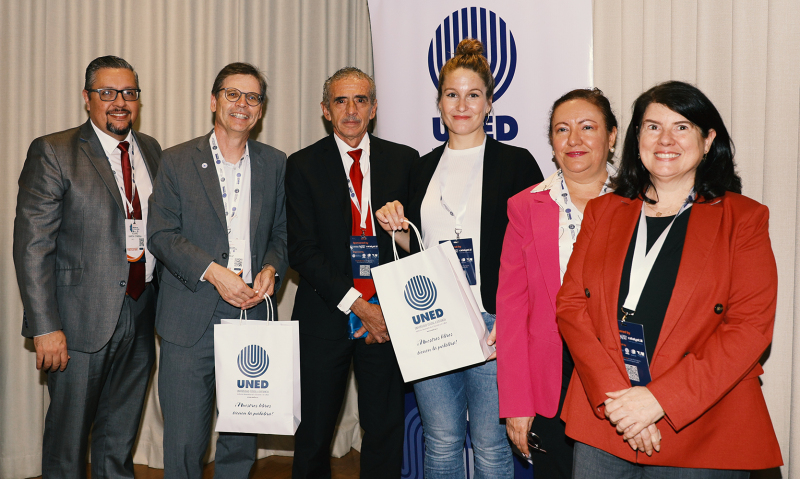 Photo: Rahel Hutgens
Photo: Rahel HutgensOld but Gold – Picking up and Strengthening “Old” Relationships: A Look at the UNED and ICDE Conference Visit to Costa Rica
“Old love never dies” might come to mind when you hear the backstory behind the visit to Costa Rica in November 2023 made by Vice-President Uwe Elsholz and Rahel Hutgens, Head of the International Office. The institutions’ many similarities regarding structure, working methods, and visions for the future have now prompted them to resume contact and strengthen their cooperation. After all, in 1988, the FernUniversität and its “sister institution” in Costa Rica, the Universidad Estatal a Distancia, or UNED for short, had already established a declaration of intent.
In the 1990s, many Costa Rican colleagues visited the FernUniversität, which has left a lasting impression on them: they remember the FernUniversität as a forward-looking, open, and innovative institution and have fond memories of their time in Hagen – so much so that, despite the language barrier, they visit the FernUni websites every so often to find out about new developments!
When two former guests, who had since been appointed Vice-Rectors, became aware of the Hagen Manifesto and resumed communication with us, the FernUniversität finally got down to business.
Micro-Credentials and AI Major Topics Worldwide
With that in mind, on November 23, Vice-President Elsholz and Rahel Hutgens traveled to Costa Rica not only to get to know UNED and the colleagues there but also to actively participate in the International Council for Open and Distance Education (ICDE) conference. The ICDE conference takes place every two years. It is a meeting place for open and distance-teaching universities from all over the world to discuss trends and current developments. This time around, AI in teaching was another major topic besides micro-credentials. The FernUni contributed with a presentation on the MCE project.
A Visit to the Sister Institution in Costa Rica
The trip to Costa Rica confirmed the impression that the FernUniversität and UNED have a lot of things in common – not only are their logistics centers almost identical but also their logos! What’s more: UNED – like the FernUni – has many campus locations that are spread across the country, one of which our delegation was also able to visit.
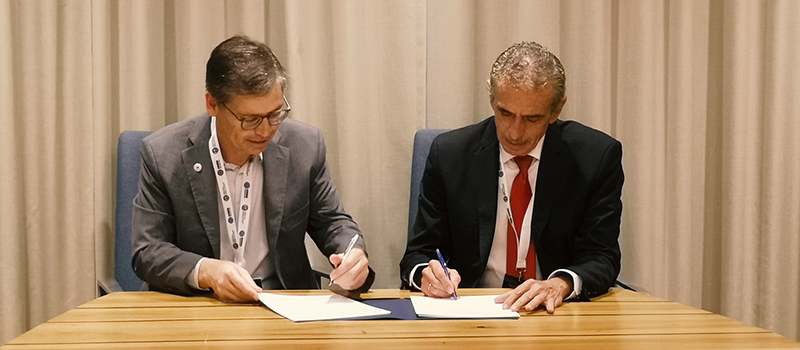 Photo: Rahel Hutgens
Photo: Rahel HutgensInteresting and Productive
The days spent at UNED were as interesting as they were fruitful, which has intensified collaboration between the two institutions and will pave the way for a number of joint projects. A Memorandum of Understanding will shortly institutionalize the connection. As a first step, Rector Rodrigo Arias Camacho signed the Hagen Manifesto – at first only symbolically, later online – and emphasized that UNED fully endorses the FernUni’s vision.
(24.01.2024)
Global together: International Day on 26.10.2023
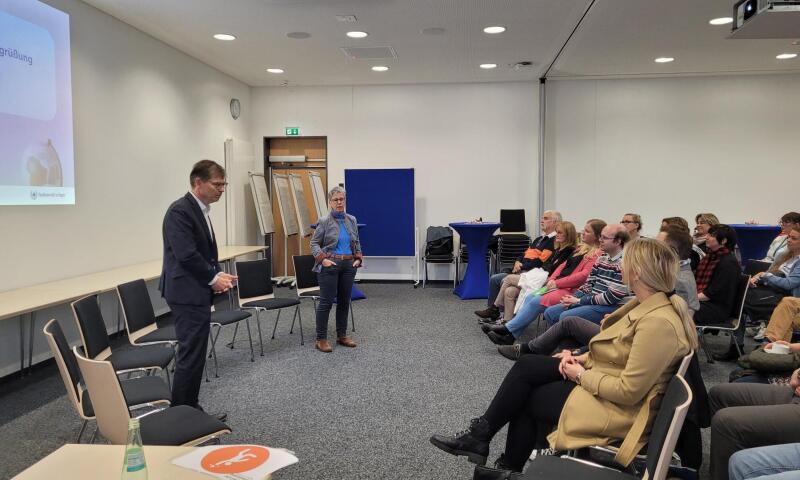 Photo: FernUniversität
Photo: FernUniversität"Together globally – opportunities for internationalization for colleagues from technology and administration" – that was the motto of this year's International Day on 26 October at the FernUniversität. The event was aimed specifically at technical and administrative staff, who play a particularly important role in implementing the internationalization of the FernUniversität, but are often not involved in the strategic processes early enough.
The event began with a welcome address by the Vice-President for International Affairs, Prof. Uwe Elsholz, and the Head of Administration, Birgit Rimpo-Repp, who pointed out how the development of skills among non-academic staff has a positive impact on the welcoming culture of a university and also appealed to managers to promote and encourage the internationalization efforts of their employees.
In a subsequent round of talks, the guests gained an impression of the process and added value of a staff week or a language course abroad when colleagues reported on their personal experiences.
The employees of the International Office and a member of the HR development team added to this by explaining the specific opportunities on offer and presented various ways in which employees from the areas of technology and administration can gain international experience, be supported in international matters and receive further training in this area.
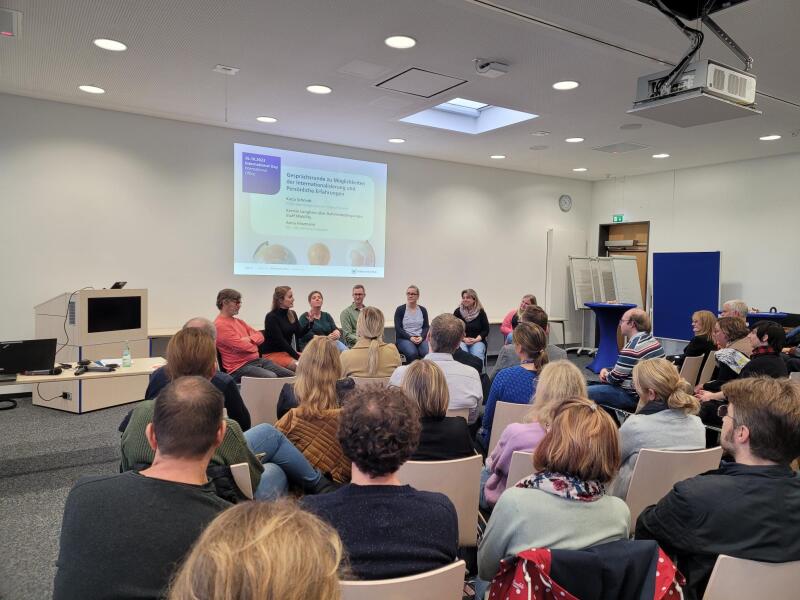 Photo: FernUniversität
Photo: FernUniversitätInteractive second part with many ideas
As part of a World Café, the participants discussed various topics at three tables. The focus was on communication & processes, personal skills development and an ideas workshop on internationalizing the framework conditions. Numerous ideas were collected and formats proposed.
More direct and personal exchange desired
It became clear that more direct and personal exchange between the departments, but also with the international guests, is desired for personal and institutional development at all levels. The participants agreed that English skills and English language skills are the key to the successful internationalization of the FernUniversität. At the end of the event, there was still time to engage in personal discussions over a buffet.
The ideas and suggestions are of particular importance for the work of the International Office and some of them will certainly find their way into the FernUni. So stay tuned!
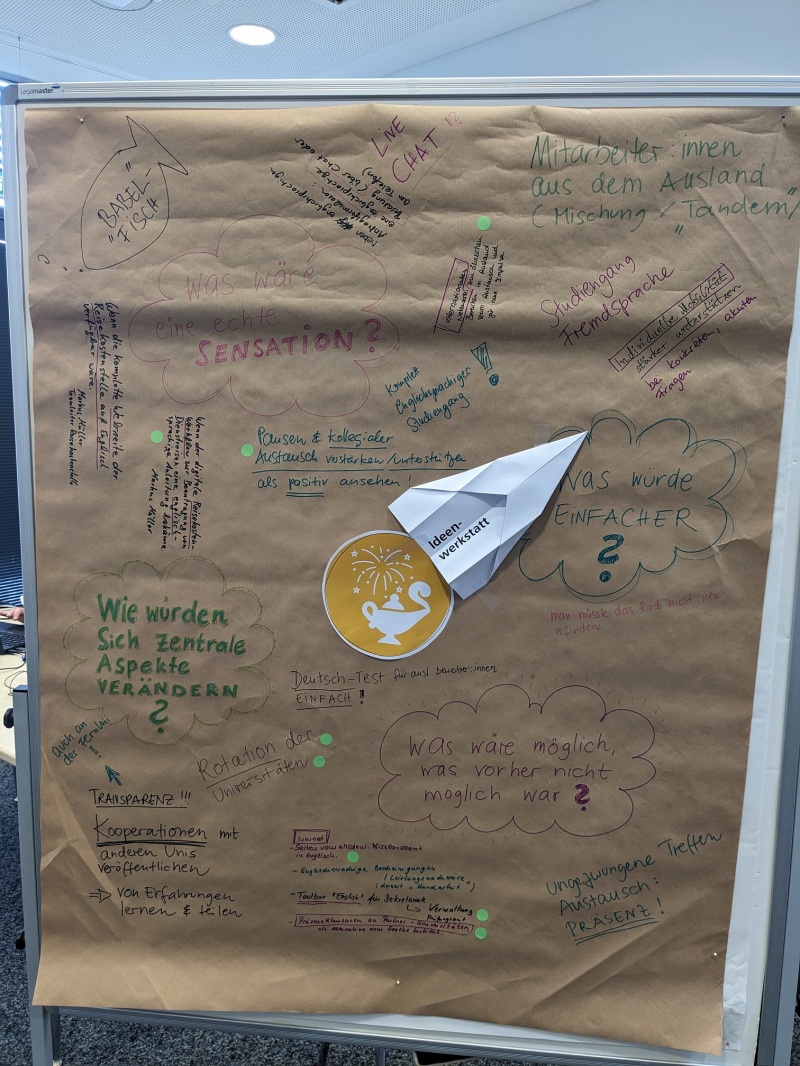 Photo: FernUniversität
Photo: FernUniversitätAuslandsaufenthalte für Beschäftigte
Übersetzungs- und Lektoratsservice
(02.11.2023)
Excursion of the international regulars' table to the Hagen Open-Air Museum
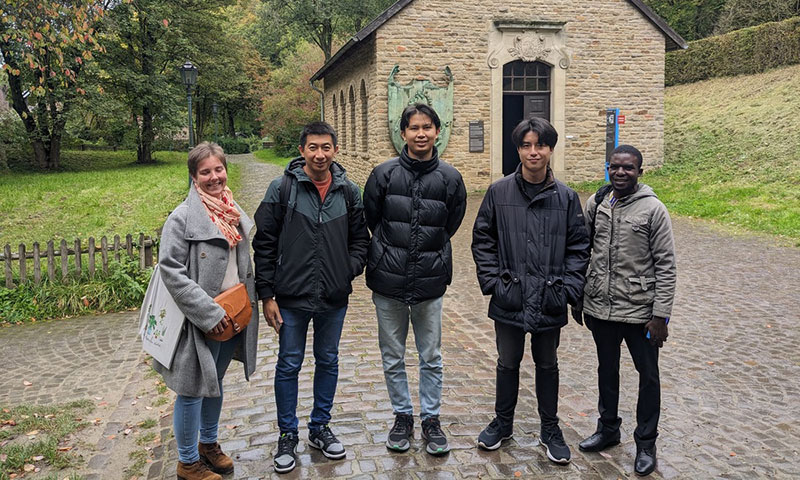 Photo: FernUniversität
Photo: FernUniversitätOn October 19, the regulars' table for international employees and guest researchers went on an excursion to the LWL Open Air Museum in Hagen. In autumnal weather, a small group of scientists from computer science and psychology, accompanied by staff from the International Office, explored one of the most famous attractions in Hagen. Here, the new employees were able to experience live how tools are forged in the traditional way.
(20.10.2023)
FernUni strengthens cooperation with Open University of Cyprus
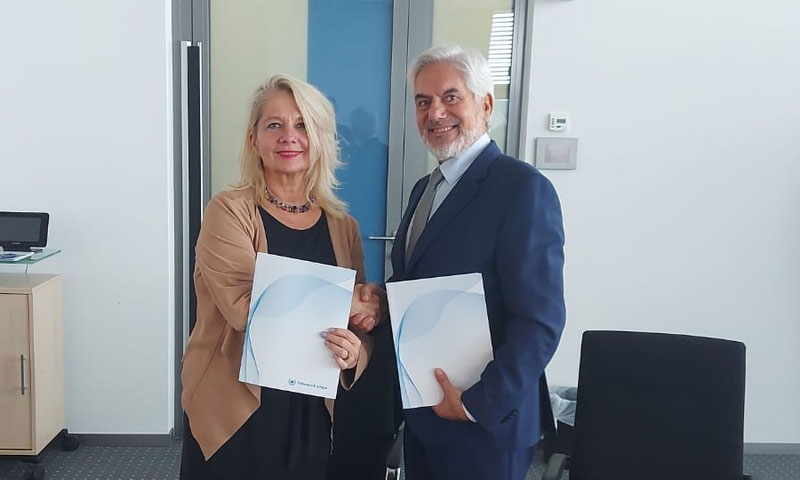 Photo: FernUniversität
Photo: FernUniversitätAt the end of September 2023, the FernUniversität received a visit from Cyprus: Prof. Petros Pashiardis, Rector of the Open University of Cyprus (OUC), was on campus in Hagen to get to know the FernUniversität personally and, above all, to strengthen the relationship between the two institutions through a Memorandum of Understanding (MOU).
Even though the OUC is a lot smaller than the FernUniversität, the two state distance universities have a lot in common, can learn from each other and grow together. There is already cooperation between the two universities at various levels; they are both part of the European Association of Distance Teaching Universities (EADTU) network, of which Rector Ada Pellert is currently Vice-President.
Memorandum of Understanding
The Memorandum of Understanding has now institutionalized the cooperation, which will facilitate future projects. For example, the option of a double degree is to be explored, research projects initiated and mobility opportunities for technical and administrative staff facilitated. "We are heavily involved in the EADTU, in which the Open University of Cyprus is also active. We are all the more pleased about the entire concrete cooperation project in the field of educational leadership, which allows us to combine international approaches and national necessities in the best possible way," said Pellert after signing the memorandum.
(01.10.2023)
International Virtual Summer School – Keep Cool: Stories of Adaptation in the Warming City
 VasjaKoman/GettyImages
VasjaKoman/GettyImagesThe clock is ticking – climate change requires urgent action. The IPCC's latest synthesis report in March this year marks the climate researchers' "final appeal" for action. All the signs indicate that we can expect global warming of two degrees or more by the end of this century. The coming years will be characterized by a warmer climate - but how can we prepare biological, social and technological systems for this?
Together with infernum, the International Office held an international virtual summer school for the first time from August 21-26, which was dedicated to the topic of climate change and its adaptation and was open to both FernUni students and international students.
In this one-week summer school, international experts shed light on the topic from various disciplines and perspectives. Through direct exchange with each other, the participating students learned about different regional conditions and approaches and even practiced telling their own climate adaptation stories. The Summer School offered them the opportunity to work together collaboratively in a digital and international setting and to use creative tools to communicate climate change.
Input from psychology: lecture by Professor Robert Gaschler
Expert input also came from the FernUniversität. Prof. Gaschler shed light on the topic from the perspective of his research field of psychology, learning, motivation and emotion and explored the question of how to bring about a positive outlook for the future and promote changes in people's behavior in a lecture.
The participants study both at the FernUniversität and at partner universities such as the University of Namibia or Jyväskylä University. For them, the summer school was a complete success. One participant found that "the summer school was well organized and inclusive, with interactive sessions that encouraged everyone to contribute." Co-moderator Dr. Lisa Pettibone from the Department of Policy Analysis and Environmental Politics and the Interdisciplinary Distance Learning Program in Environmental Sciences (infernum) is also enthusiastic about the international cooperation and the results: "It was totally encouraging to see the quality of the results after a few days of working together. Together with the participants, I experienced live what they are capable of within a very short time. This is important, as the climate crisis is not waiting for us!"
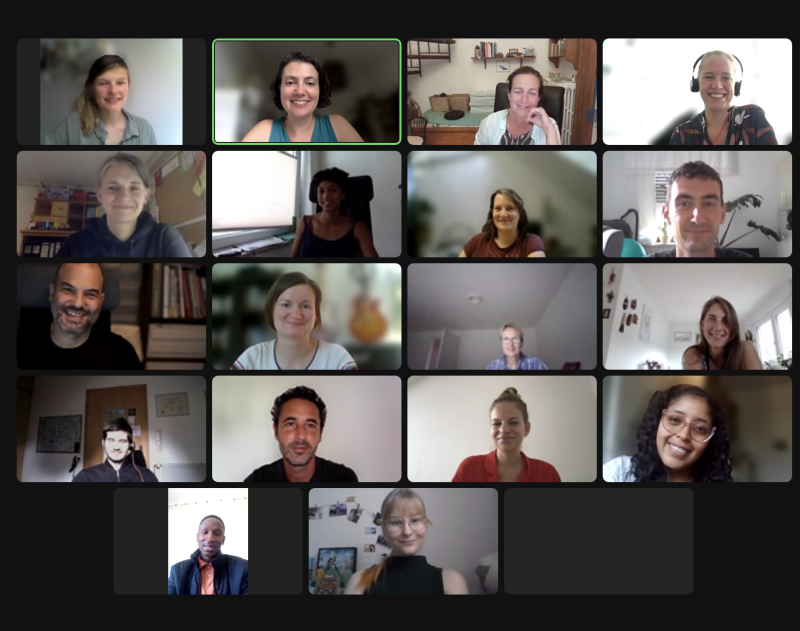 Photo: FernUniversität
Photo: FernUniversitätFor this reason, there will also be opportunities in the future to gain international experience as part of interdisciplinary summer schools. Plans are already being made as to how the format will be continued.
The experts at the Summer School:
- Georgia Atkin
Lecturer at the Universidad Estatal a Distancia (UNED), Costa Rica - Prof. Alessandra Jerolleman
Climate Justice Lead with the U.S. Geological Survey’s National Climate Adaptation Science Center, USA - Prof. Dr. Robert Gaschler
FernUniversität in Hagen, Faculty of Psychology, Allgemeine Psychologie: Lernen, Motivation, Emotion - Zuza Nazaruk
Freelance climate adaptation journalist and member of the Sinking Cities project, Netherlands/Poland - Kirsten Sander
Competence Center Climate Impacts and Adaptation (KomPass), Federal Environment Agency (UBA) - Umar Sheraz
Futurist and researcher at COMSATS University Islamabad, Pakistan - Prof. Antoni Roig Telo
University Oberta de Catalunya, Information and Communication Sciences Department, Spanien - Dr. Martin Werner
Alfred-Wegener-Institute, Helmholtz-Center for Polar and Marine Research; infernum
(30.08.2023)
Internationalization Fund: Special call for proposals 2023 published
 Westend61/GettyImages
Westend61/GettyImagesAre you planning an international project or are you still at the very beginning of an international cooperation? In addition to our internationalization fund, you now have the opportunity to receive start-up funding for an internationalization project as part of a special call for proposals. The aim is to consolidate existing partnerships or initiate new collaborations and projects in order to build trust through personal contacts, get to know the respective university/subject culture better and develop joint project ideas on site. A prerequisite for funding is that a funded project should result in either a third-party funding application or an approved (new) cooperation agreement within one year.
One of the following measures can be applied for as part of the special invitation to tender:
- Project initiation trips to (potential) project partners (with up to 10.000 €)
- Return visits by stakeholders from the partner university to the FernUniversität (up to 10.000 €)
- Funding for a research assistant or student assistant to prepare an application for a project to raise third-party funds (up to 20.000 €)
The detailed tender criteria and further information can be found in the application criteria.
Are you interested? Then please send the completed application, including a brief project description with reference to the tender objectives, by July 31, 2023 to international.
Application form (PDF 80 KB, Deutsch)
Application criteria (PDF 97 KB, Deutsch)
(01.07.2023)
Erasmus+ Staff Week at the FernUniversität
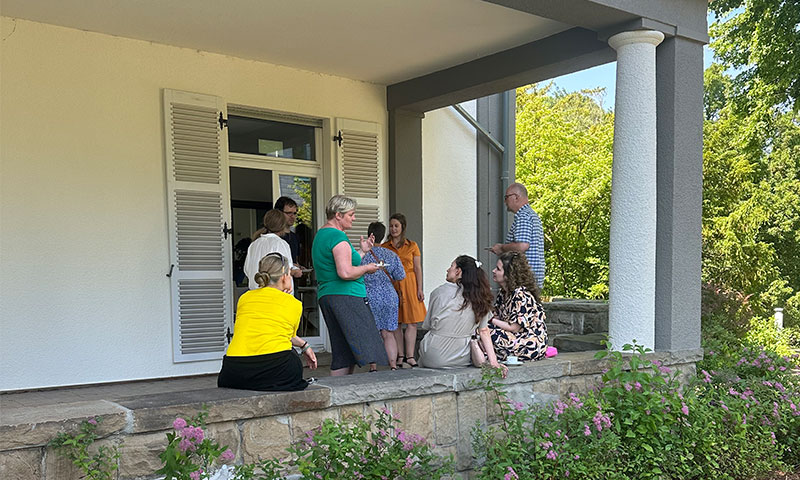 Photo: FernUniversität
Photo: FernUniversitätEleven employees from European (distance-learning) universities in Latvia, Spain, Turkey, and Finland spent an enjoyable week with us on campus in Hagen. Taking part in the FernUni’s International Staff Week (organized by staff in the International Office), colleagues from abroad enjoyed numerous opportunities to exchange ideas, network, and get to know the FernUniversität in Hagen.
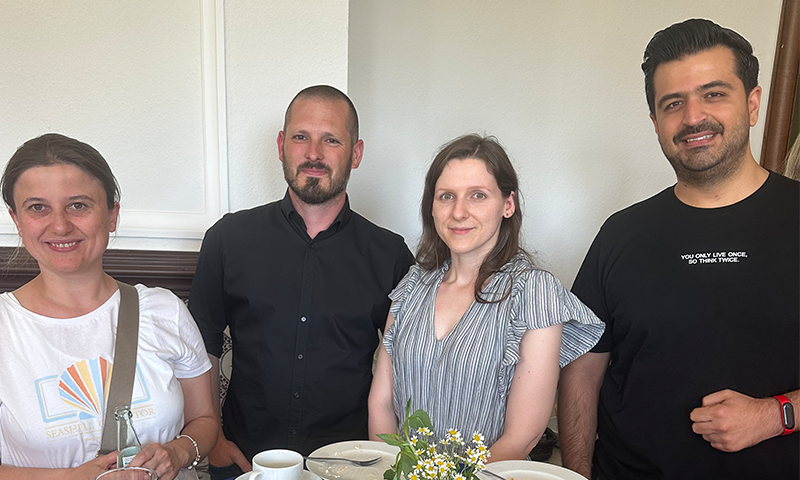 Photo: FernUniversität
Photo: FernUniversitätA visit to the FernUniversität’s video studio on Tuesday left the visitors very impressed: “We also hope to invest even more in online lectures and e-learning. The technology here is really impressive. In that respect, the studio here in Hagen is an exciting role model,” enthused one of the participants from Riga. Discussions about current opportunities and challenges at the various universities, as well as personal exchanges, make the International Staff Week an enriching experience for all the participants: “It’s a fantastic opportunity: having the chance to spend an entire week with colleagues from different countries. I’ll be taking home so many new ideas and some great contacts,” says a colleague from Turkey.
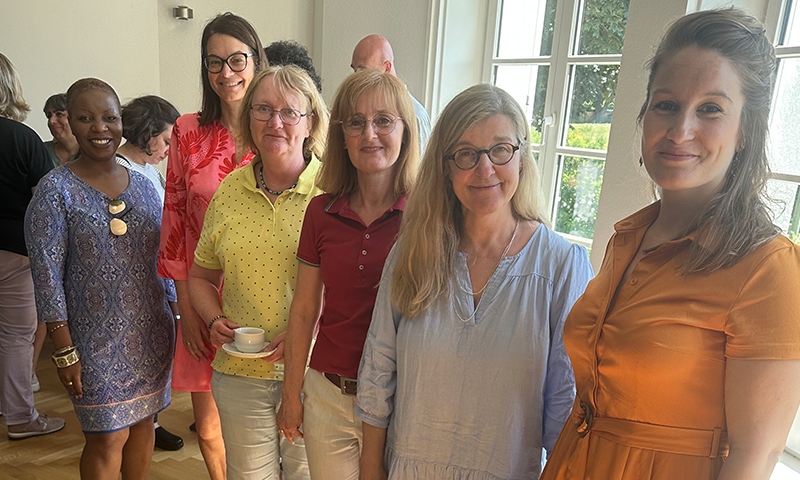 Photo: FernUniversität
Photo: FernUniversitätAlongside visitors from the Turkish universities Dokuz Eylül Üniversitesi, Gazi Üniversitesi and Adana Alparslan Türkes Bilim ve Teknoloji Üniversitesi, the participants of the International Staff Week work at the Open University of Jyväskylä, Finland; Universitat Oberta de Catalunya in Spain and EKA University of Applied Sciences in Latvia. From Monday to Friday, the participants had many chances to get to know not only the FernUniversität but also the City of Hagen: On Thursday, our guests paid a visit to the logistics center, after which the international guests joined in the celebrations on campus at the FernUni’s summer party.
(21.06.2023)
Cooperation with the University of Namibia Finalized
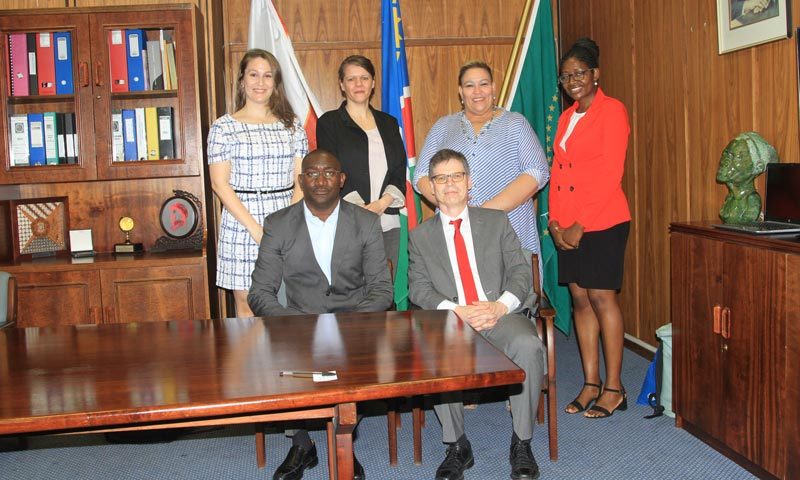 Photo: FernUniversität
Photo: FernUniversitätThe FernUniversität in Hagen and the University of Namibia (UNAM) have sealed their cooperation by signing a memorandum of understanding (MOU). The roots of the current collaboration go back to the initial meetings in 2022; now the cooperation is enshrined in a fixed framework.
“We have now reached agreement at the university level, and the road ahead is well prepared. Luckily, we were able to draw on the support and assistance of a number of existing contacts. The MOU makes future cooperation even easier. And we will be on hand to provide the best support we can in initiating and deepening our joint efforts," explains Prof. Uwe Elsholz, Vice-President for Continuing Education, Knowledge Transfer, and International Affairs at the FernUni. He was a key member of the delegation that recently met in Namibia's capital Windhoek, where UNAM is located.
Joint Project Proposals
In addition to meeting with members of the University management team, the Hagen delegation also took time to connect with partners from already existing research projects, including one in the area of social psychology. “Now that we have an official cooperation agreement, we can submit joint project proposals and work on other collaborations. For instance, it will be possible to co-supervise doctoral candidates,” enthused Dr. Rahel Hutgens, Head of the International Office at the FernUni. She is confident that the international cooperation will be of great benefit to both partners.
Possibilities for Students
UNAM has good prerequisites in this respect: it is an on-campus university which also offers many opprtunities for distance learning. From its central base in Windhoek, UNAM works together with twelve regional centers. Although English is the country’s official language, German is still spoken in some parts of Namibia, a remnant of colonial rule.
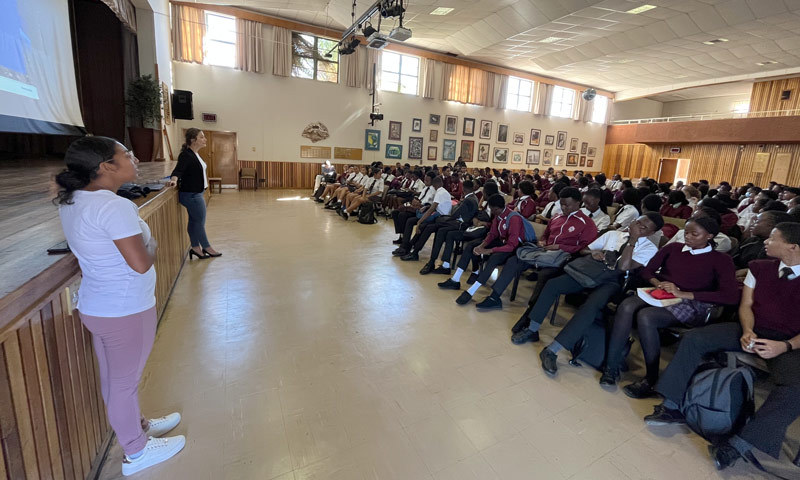 Photo: FernUniversität
Photo: FernUniversitätSome students from Namibia have already completed courses at the FernUni. This was made possible by various individual collaborations, for instance in the departments of computer science and history. Now the FernUniversität is hoping to open up to students from Namibia. The delegation found that student interest was even greater than they had previously assumed.
"We spoke to around 150 schoolchildren at a school with a German-style curriculum and were pleasantly surprised how well prepared they were and by the concrete questions they had about studying at the FernUni.” Rahel Hutgens is optimistic that the first students will already be able to enrol in the summer semeter of 2024: via the so-called alternative university access for foreign students. The school in Windhoek is a member of the PASCH-Initiative network – PASCH is a portmanteau of “Schools: Partners of the Future.” The worldwide initiative networks more than 2,000 schools in which German plays a particularly important role. It is supported by the German Federal Foreign Office and the DAAD.
A “Sister Institute” for the ZLI
In addition, the MOU will make it possible to travel to Namibia within the framework of the Erasmus+ program Staff Mobility program. Stronger cooperation will also possible at the teaching level: while at UNAM, Dr. Annabell Bils visited the ZLI’s “sister institute,” CILT (the Centre for Innovation in Learning and Teaching), in her role as Managing Director of the Center for Teaching and Innovation (ZLI).
(30.04.2023)
International Office: “We can help”
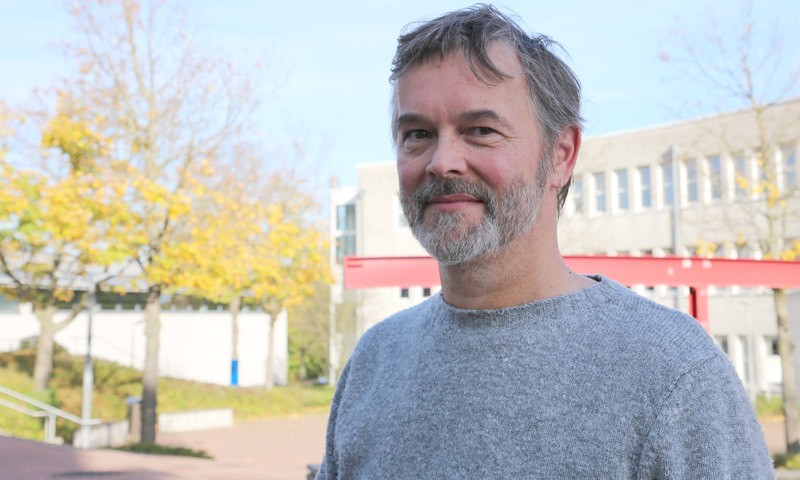 Photo: FernUniversität
Photo: FernUniversitätAdvise, support, translate: The FernUni International Office was at this year’s International Day to let people know all about the many services it provides and the possibilities on offer. One of these is the English Language Services, for which Nick Quaintmere, along with copy editor Daniel Löhlein, has been responsible since August 2022.
Nick Quaintmere worked as a freelance translator for almost 20 years, and now the native speaker is putting his English skills at the service of the FernUni. “My job is primarily to translate documents for the administration departments and the faculties, but also sometimes abstracts or short texts for research papers, and international as well as inter-university agreements,” explains the 55-year-old. “In the future, I also plan to invest a proportion of my time in expanding and updating the English website.” Specifically, the English Language Services relate to international research and project proposals, brochures, and also translations of central texts that are necessary for the infrastructure of internationally oriented research, teaching, and running of the university.
Together with his colleague Daniel Löhlein, Nick Quaintmere, who has a degree in German and political science, also runs the English Conversation Club: The offer is aimed at all FernUni employees, especially technical and administrative staff, who would like to improve their English in an informal conversational atmosphere. The Conversation Club meets online twice a month and is also attended by employees of the Finnish Open University of Jyväskylä and the Universitat Oberta de Catalunya in Barcelona, Spain.
“This isn’t a teaching session,” says Quaintmere, to allay any potential fears. “I’m just there to inject ideas and to keep the conversation between the participants moving along.” With a wink, he adds: “I can fully understand if someone feels a little hesitant when trying to use a foreign language. I didn’t start learning Spanish until pretty late myself – and I didn’t learn academic German until I was 30.”
EADTU in Athens
At this year’s conference of the European Association of Distance Teaching Universities (EADTU), President Prof. Ada Pellert was elected to the Supervisory Board of the EADTU. Other participants from the FernUniversität included Vice-President Prof. Uwe Elsholz, Dr. Rahel Hutgens and Mareike Weiß from the International Office who made the trip to Athens.
Internationalization as Potential
The presentation of the English Language Services at the International Day 2022 was part of a ‘Flying Lunch’ event, at which different university departments presented themselves along with their connections to internationalization. In addition, a panel discussion highlighted the range of activities at the FernUni: from strategic internationalization, mobility programs, international research collaborations and summer schools, and even distance learning centers abroad. “The panel discussion in particular highlighted very well what a variety of players are active in the field,” noted Prof. Dr. Uwe Elsholz, Vice-President for Continuing Education, Knowledge Transfer, and International Affairs. He summed up by saying: “Being able to hold the International Day on campus was very beneficial. It was a way for colleagues who had previously only exchanged ideas online to finally meet in person.”
(01.02.2023)
Cooperation with the University of Namibia
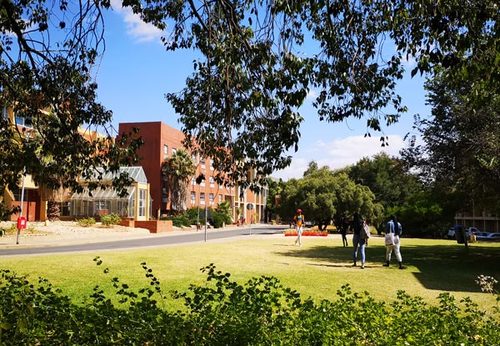 Photo: UNAM
Photo: UNAMThe FernUniversität in Hagen is working to establish a university-wide cooperation at the levels of study, research and administration with the University of Namibia (UNAM) in Windhoek. A number of projects from various different departments have been already initiated. Up to this point, it has been individual initiatives that have established contact with UNAM in order to launch joint projects. Now the International Office (IO) at the FernUniversität has picked up these individual threads to weave them into a more coherent partnership.
“This cooperation with Namibia has great potential for the FernUniversität,” says Dr. Rahel Hutgens. After taking over as head of the IO in November 2021, she encountered the topic of Namibia several times while making her personal introductions at the FernUni. She discovered that concrete projects have already been initiated by several departments, including Computer Science, the History Institute and Psychology, for example, to enable Namibian students to take courses at the FernUni and to implement research projects. The planned partnership could start as early as the winter semester of 2022/23.
In principle, the prerequisites for the cooperation are good. The University of Namibia is organized in a comparable way: “as a face-to-face university with a distance-learning component,” as Hutgens puts it. “UNAM also has a main site, in the capital Windhoek, and twelve regional centers spread across the country.” Namibia’s official language is English, but one of its other national languages is German – a consequence of the German colonial period, which ended in 1915 following a cruel war against the indigenous population.
 Photo: International Office
Photo: International OfficeFirst Global Collaboration
This would be the FernUniversität’s first global institutional cooperation to complement those at the European level with distance-learning universities in Finland, the Netherlands and Catalonia. “Working together with an African country offers us a real change of perspective,” Hutgens believes. During a visit to Windhoek in the early summer, she was able to a first-hand impression of UNAM when she met her Namibian counterpart on site and held various discussions with department head. Following a virtual exchange between Prof. Dr. Uwe Elsholz, Vice-President for Continuing Education, Knowledge Transfer, and International Affairs, and Prof. Frednard Gideon, Pro-Vice Chancellor of UNAM, all were in agreement: “We are putting together a ‘Memorandum of Understanding’ as the FernUniversität to express our firm intention to cooperate with UNAM.”
Cooperation Projects
- Virtual Mobility for UNAM students, Faculty of Mathematics and Computer Science
- Research field “Social History of Namibia,” Department of European History in a Global Context
- Psychology without Borders: Exploring Potential for Cooperation in Distance Education and Research in Psychology, Department of Social Psychology
Administration Workshops
Workshops are also being planned on intercultural issues for administrative staff from the departments and the university administration as well as on the UN’s Sustainable Development Goals. “This was an issue that dear to many at UNAM,” Hutgens says. In addition, Namibia offered its support to the Erasmus Staff Mobility program. “During Corona, it wasn’t possible to organize exchanges with other countries. Now the program is starting up again,” says Hutgens.
(27.10.2022)

